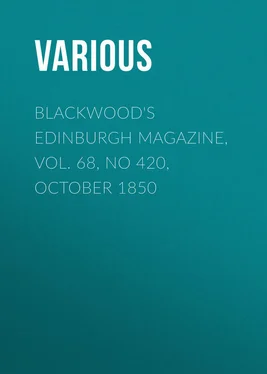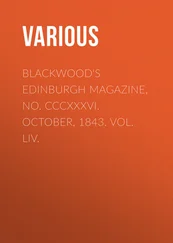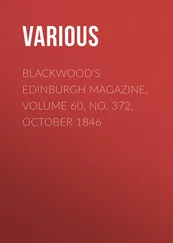Various - Blackwood's Edinburgh Magazine, Vol. 68, No 420, October 1850
Здесь есть возможность читать онлайн «Various - Blackwood's Edinburgh Magazine, Vol. 68, No 420, October 1850» — ознакомительный отрывок электронной книги совершенно бесплатно, а после прочтения отрывка купить полную версию. В некоторых случаях можно слушать аудио, скачать через торрент в формате fb2 и присутствует краткое содержание. Издательство: Иностранный паблик, Жанр: periodic, foreign_edu, Путешествия и география, на английском языке. Описание произведения, (предисловие) а так же отзывы посетителей доступны на портале библиотеки ЛибКат.
- Название:Blackwood's Edinburgh Magazine, Vol. 68, No 420, October 1850
- Автор:
- Издательство:Иностранный паблик
- Жанр:
- Год:неизвестен
- ISBN:нет данных
- Рейтинг книги:4 / 5. Голосов: 1
-
Избранное:Добавить в избранное
- Отзывы:
-
Ваша оценка:
- 80
- 1
- 2
- 3
- 4
- 5
Blackwood's Edinburgh Magazine, Vol. 68, No 420, October 1850: краткое содержание, описание и аннотация
Предлагаем к чтению аннотацию, описание, краткое содержание или предисловие (зависит от того, что написал сам автор книги «Blackwood's Edinburgh Magazine, Vol. 68, No 420, October 1850»). Если вы не нашли необходимую информацию о книге — напишите в комментариях, мы постараемся отыскать её.
Blackwood's Edinburgh Magazine, Vol. 68, No 420, October 1850 — читать онлайн ознакомительный отрывок
Ниже представлен текст книги, разбитый по страницам. Система сохранения места последней прочитанной страницы, позволяет с удобством читать онлайн бесплатно книгу «Blackwood's Edinburgh Magazine, Vol. 68, No 420, October 1850», без необходимости каждый раз заново искать на чём Вы остановились. Поставьте закладку, и сможете в любой момент перейти на страницу, на которой закончили чтение.
Интервал:
Закладка:
On the eleventh day of December 1839, the Grand Jury returned a true bill for high treason, against John Frost and thirteen of his followers; and on the very next day – viz., Thursday the twelfth , in order to oblige the prisoner, by giving him the longest possible time for availing himself of the important information contained in the indictment , and the jury list – copies of these instruments were delivered to him by the Solicitor of the Treasury. On the ensuing Tuesday, the 17th, he delivered to the prisoner a list of the witnesses ; and, the trial having been appointed to take place on the 31st December, five days previously to the latter day – viz., on the 26th December – Sir Frederick Pollock and Mr Kelly were assigned to John Frost, as his counsel, on his application pursuant to the statute to Mr Bellamy, the clerk of the Crown. It is here essential, in order to appreciate the immense importance of the earliest moves in this life-and-death game, to weigh every word in the following brief enactment, under which the above documents were delivered to the prisoner: the humane object of the legislature being to afford him ample time to prepare his defence. – "When any person is indicted for high treason, a list of the witnesses , and of the jury , mentioning the names, profession, and place of abode of the said witnesses and jurors, be also given at the same time that the copy of the indictment is delivered to the party indicted – which copy of the indictment shall be delivered ten days before the trial." 10 10 Stat. 7 Anne, c. 21, § 11.
Thus it will be seen that as the trial was to take place on Tuesday the 31st December, Mr Maule might have delayed delivering these documents to the prisoner till the 20th, and perhaps till the 21st December; but, solely to favour the prisoner, he delivered two of them – viz., the indictment and jury list – so early as the 12th, and the list of witnesses so early as the 17th December. Let us see, by and by, whether anything comes of this, and of the lengthened study, by the prisoner's counsel, of these three documents.
On Tuesday the 31st December 1839, all the fourteen prisoners were arraigned on an indictment consisting of four counts: two for levying war against her Majesty in her realm; a third for compassing to depose the Queen from her royal throne; and the last, for compassing to levy war against the Queen, with intent to compel her to change her measures. To this indictment each of the fourteen prisoners pleaded not guilty; and it is to be particularly observed that they all did so without making any objection on any score. Thus was taken the first move by the Crown counsel, who may possibly, for aught we can at present see, have thereby gained some very great advantage. Let us now conceive the solemnly-exciting scene of the court house at Monmonth, on this memorable trial. Three judges sitting, in their imposing scarlet and ermine vestments, calm and grave; a phalanx of counsel sitting beneath them; the prisoners standing at the bar, on their deliverance, silent as the grave, while the fate-fraught procedure of the court was methodically going on; the spectators crowding every part of the court that they could occupy, and all silent, nothing heard but official voices; while without that court all was excitement – repressed, however, by the stern presence of the civil and military power; detachments of troops at that moment scouring the adjacent hills in quest of malcontents, and preventing any fresh rising of the population.
The first step taken by the prisoner's counsel was to state that they appeared for John Frost alone, and should challenge the jury separately: on which all the other prisoners were removed from the bar, John Frost remaining to take his trial alone. Then came the swearing of the jury – the name of every one, with his calling in life, and place of abiding, being known to the prisoner and his counsel, who objected to the very first step taken by the clerk of the Crown. He had begun to call over the names in their alphabetical order on the panel – the usual course for a great series of years; but Sir Frederick Pollock objected to his doing so, insisting on each juror's name being taken from the ballot-box. The Lord Chief-Justice was about to have overruled the objection; but the Attorney-General intimated that he consented to the course proposed by the prisoner's counsel. Each witness was sworn first on the voir dire , ( i. e. dicere verum ) as to his qualification, before he was sworn to try. First came a juryman who was challenged peremptorily on the part of the Crown; but the prisoner's counsel, doubtless for very good reasons, wishing him to remain on the jury, insisted, first, that the Crown had no such right – an objection at once overruled; secondly, that the crown was too late, as the juror had actually got the New Testament into his hand to be sworn to try before the Crown challenged. But, on the court's inquiry, it turned out that the witness had himself taken the book, without having been directed to do so by the clerk of the Crown. Under these circumstances, the court decided that the Crown were in time with their challenge – and the juryman was excluded. In this kind of out-skirmishing the whole of the first day was consumed! – a full jury not having been sworn till the evening, when they were "charged" with the prisoner and then dismissed for the night – but with the unpleasant information from the court, that they themselves were thenceforth prisoners (though with every kind of proper indulgence) till the trial was over.
On the next morning, just as the Attorney-General was rising to state the case of the Crown, he was interrupted by Sir Frederick Pollock, and doubtless sufficiently astonished by what fell from him: "I feel myself bound, at the earliest moment – and this is the first opportunity that I have had, – to take an objection which must occur the moment that the first witness is put into the box, – namely, that the prisoner has never had a list of the witnesses, pursuant to the statute , and that therefore no witness can be called !" What could be the meaning of this? inquired the Attorney-General's companions among themselves, with no little anxiety; but he himself somewhat sternly censured the interruption, as premature, (as it certainly was,) and proceeded with his address to the jury. He made a lucid and very temperate statement of the case – drawing attention prominently to the necessity imposed on him of proving that what had been done by Frost and his companions was with a general , and not a particular object, – a public , and not a private purpose. His proposed proof was crushing: but immediately on the Solicitor-General's calling the name of the first witness, Sir Frederick Pollock rose, and required him to prove the delivery of a list of the witnesses, containing the particular one in question, pursuant to the statute. The Attorney-General then called Mr Maule, who proved having done what has already been explained: whereupon Sir Frederick Pollock disclosed the exact objection, which he himself had been the first to detect – that whereas the statute required all these documents, — i. e. , the indictment, the jury list, and witness list – to be delivered " at the same time ," in the present instance that had not been done, the first two having been delivered on the 12th, and the list of witnesses on the 17th December! This was a very formidable move on the part of the prisoner: who stood at the bar on his deliverance – the jury being bound to convict or acquit according to evidence, and none could be offered them! If that were so, he must of necessity be pronounced not guilty, and be for ever safe. The objection was urged with extreme tenacity and ingenuity by both the prisoner's counsel, who insisted on the statute of Anne receiving a strict literal construction of the words "at the same time," – admitting the benevolent intentions by which Mr Maule had been actuated. The Attorney-General argued very earnestly against this startling objection, denying that it had any validity – asserting that the statute had been substantially complied with; and that the objection, if valid, had been waived; and that it was made too late – viz., not till after the prisoner had pleaded to the indictment, and the jury been charged with the prisoner. The Attorney-General's astute argument, however, was interrupted by the Lord Chief-Justice, stating that the court had a sufficient degree of doubt on the point to reserve it for further consideration by the judges at Westminster, should it become necessary: for, if their objection were valid, it affected every one of the fourteen prisoners awaiting their trial! Then came another desperate attempt of Sir Frederick Pollock, to secure his client the benefit of an acquittal , in the event of the judges ultimately deciding that the objection ought to have been decided in the prisoner's favour at the trial. This, however, the Attorney-General again strongly opposed; and the court cautiously ruled, that, in the event contemplated, the prisoner would be entitled then to the same benefit to which he would have been entitled at the trial – without saying what that would have been. The witness thus provisionally objected to was then admitted; but only to be, at first, sworn on the voir dire , on which a lengthened examination and some argument ensued – each of the judges delivering judgment on the excessively refined and astute objection to the manner in which the witness's place of abode had been described in the list – which was such as that it was just imaginable, and nothing more, that an inquirer might have been misled! The objection was overruled in the case of the first witness; but on the ensuing two witnesses – and most important witnesses – being called, a similar objection was taken, but too successfully, and their evidence, consequently, altogether excluded! – excluded solely on account of the anxious " over -particularity" of the Crown! Nor were these the only witnesses whose testimony was, on such grounds, rendered unavailable to the Crown.
Читать дальшеИнтервал:
Закладка:
Похожие книги на «Blackwood's Edinburgh Magazine, Vol. 68, No 420, October 1850»
Представляем Вашему вниманию похожие книги на «Blackwood's Edinburgh Magazine, Vol. 68, No 420, October 1850» списком для выбора. Мы отобрали схожую по названию и смыслу литературу в надежде предоставить читателям больше вариантов отыскать новые, интересные, ещё непрочитанные произведения.
Обсуждение, отзывы о книге «Blackwood's Edinburgh Magazine, Vol. 68, No 420, October 1850» и просто собственные мнения читателей. Оставьте ваши комментарии, напишите, что Вы думаете о произведении, его смысле или главных героях. Укажите что конкретно понравилось, а что нет, и почему Вы так считаете.












